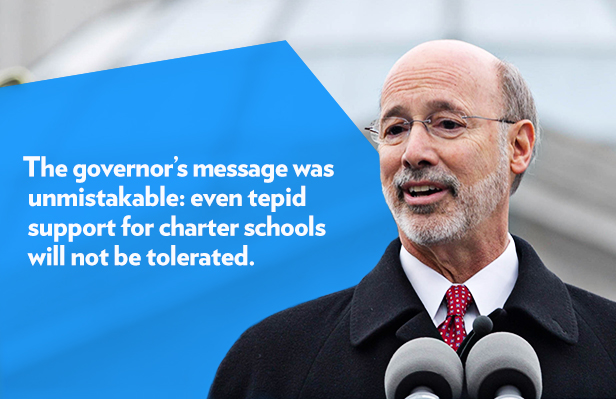Commentary

Wolf’s Education Doctrine
Note: This commentary was published in the Lancaster LNP, York Daily Record, Doylestown Intelligencer, Carlisle Sentinel, and Pottstown Mercury.
Governor Tom Wolf has wasted little time crystalizing his vision for public education—and it doesn’t look promising for families supportive of school choice.
First, the Wolf administration catered to anti-reform interests in the troubled School District of Philadelphia. After the city’s School Reform Commission (SRC) approved just a handful of new charter schools, Wolf stripped SRC Chairman Bill Green of his leadership position.
The governor’s message was unmistakable: even tepid support for charter schools will not be tolerated. It’s not as though charters secured a decisive victory in Philadelphia—34 of 39 charter applicants were rejected, leaving tens of thousands on waiting lists.
Still, this meager charter expansion was justification for Wolf to shuffle deck chairs at the SRC. Who was tapped to replace Green as chairman? Marjorie Neff, the only SRC member who voted against all 39 Philadelphia charter applicants.
A similar story unfolded in York City School District, where the Wolf administration all but forced out Chief Recovery Officer David Meckley and withdrew the state’s petition to assume control of the district. This ensures that the second-worst performing district in Pennsylvania—a district that exceeds Philadelphia by a factor of ten in many violence statistics—will jettison transformative change in favor of the failing status quo.
Meckley was appointed in 2012 to improve both the quality and financial stability of York City schools. After debating numerous reform options—and after suffering through two years of obstruction by the school board and local teachers’ union—Meckley hoped to bring in an independent charter operator to run district schools.
But Meckley abruptly resigned not long after Wolf’s election. Why? In a statement, Meckley explained that the Wolf administration’s “anti-charter position has made it impossible” to move forward with existing plans.
For another example of Wolf’s attitude towards schools of choice, look no further than his budget proposal—the clearest, most honest indicator of a governor’s policy vision.
It’s true that Wolf’s budget, which proposes the largest tax increase in state history, calls for boosting education spending. But that’s only half the story: Wolf is also pushing for harsh cuts to charter schools and axes cyber charter funding to less than 50 percent of the state’s per-pupil average.
Although Pennsylvania school districts have amassed nearly $4 billion in reserve funds, Wolf adds insult to charter schools’ injury by allowing districts to seize funding from charters’ emergency reserves. By denying charters the ability to prepare for the unexpected, the governor is needlessly placing successful educational options currently utilized by 120,000 students at risk of collapse.
Wolf’s budget is even more punitive to cyber charter students, who disproportionately come from low-income families. For them, Wolf would slash current funding levels by one-third. While the state currently spends an average of $14,600 dollars per public school student, the governor would spend only $5,950 per cyber student.
While cyber charters—like most schools serving primarily low-income students—have struggled to achieve academically, allocating less than half the financial resources to these 30,000 students is not the answer. This would cause many cyber schools to permanently shutter their virtual doors, forcing many families back into the same underachieving, unsafe schools they originally sought to flee.
If choice advocates are the big losers in Wolf’s education plans, who are the winners? Certainly traditional public schools will see higher funding levels, but the biggest winners are the state’s largest teachers’ unions.
The Pennsylvania State Education Association—which contributed nearly $1 million to Wolf’s campaign—surely stands to gain from weakened charter school competition, as well as from reduced accountability in district schools.
Your intuition might tell you that hundreds of millions in new state aid for school districts would be conditional on stronger classroom achievement, but you’d be wrong. Wolf’s approach is anything but intuitive. He supports a “holistic educational process” that actually deemphasizes tests and grades.
A “holistic” system of public education is music to the ears of union executives across the state, who typically oppose testing and robust teacher evaluation. But will it result in higher performing schools that set Pennsylvania children up for successful careers?
That remains unclear. If his first few months are any indication, however, this much is certain: Wolf is hostile to schools of choice, cozy to union interests, and wedded to the educational status quo.
# # #
James Paul is a senior policy analyst for the Commonwealth Foundation (CommonwealthFoundation.org), Pennsylvania’s free market think tank.